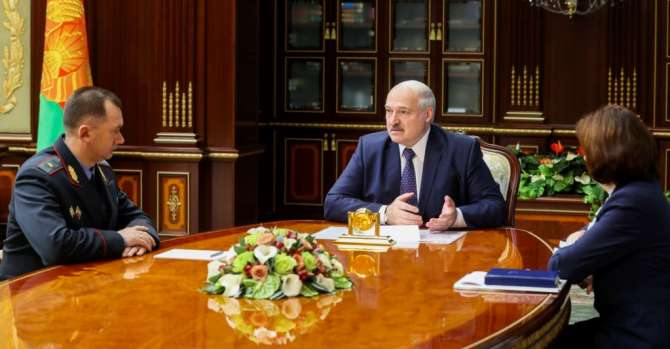Lukashenka Meets New Belarusian Security Chiefs, Warns Protesters Of 'Harsh' Measures
Rferl
1 November 2020, 23:17
 MINSK -- Alyaksandr Lukashenka, Belarus's embattled ruler, has met with his new security chiefs and sent a stark warning to protesters after he tightened his grip on the country by replacing top Interior Ministry officials and partially closing the borders, moves seen aimed at ending weeks of demonstrations over a disputed election that gave him a sixth consecutive term in power.
MINSK -- Alyaksandr Lukashenka, Belarus's embattled ruler, has met with his new security chiefs and sent a stark warning to protesters after he tightened his grip on the country by replacing top Interior Ministry officials and partially closing the borders, moves seen aimed at ending weeks of demonstrations over a disputed election that gave him a sixth consecutive term in power.
Lukashenka on October 30 appointed Mikhail Hryb as the new police chief for the capital, Minsk, introducing him along with new Interior Minister Ivan Kubrakou at a meeting of security officials where he threatened "harsh measures at the site" instead of arresting protesters.
"If anyone touches a security officer, as I already told our generals, that person should leave the site without hands at least. I am publicly saying this so that all understand how determined we are. There is nothing else left for us. We do not have space to step back, and we are not going to step back. Those who are ready will act," Lukashenka said.
Belarus has witnessed near daily protests since the August 9 vote that Lukashenka, in power since 1994, claims he won by a landslide.
Lukashenka has responded to demonstrations against the official vote outcome with a crackdown that has seen more than 10,000 arrests and accusations of torture and beatings by security forces against peaceful demonstrators. Members of the media reporting on the protests have also been attacked.
Most of the country's opposition leaders have been arrested or forced to leave the country, including presidential candidate Svyatlana Tsikhanouskaya, who has said the vote was rigged in Lukashenka's favor and that she considers herself the rightful winner. She left Belarus for Lithuania after the vote amid threats to her and her family.
On October 29, the 45-year-old Kubrakou, who prior to his appointment to the post led the Minsk city police department, replaced Yury Karayeu, the man who oversaw the brutal postelection crackdown.
Tsikhanouskaya said the reshuffle and border closure was a sign that Lukashenka is "in a panic."
Lukashenka has described ongoing strikes called by the opposition at the start of the week as "the actions of organized criminal groups."
Workers In Belarus Face Dismissal, Potential Arrest If They Join Anti-Government Walkout
He added that the country was "starting to face terrorist threats," in reference to the weeks of peaceful protests against his rule.
Western governments have voiced support for the opposition, with both the European Union and the United States refusing to recognize Lukashenka as Belarus's legitimate leader.
The EU has announced asset freezes and visa bans against 40 Belarusian officials for their alleged roles in the repression of protesters and the opposition, as well as fraud during the August vote.
On October 12, EU foreign ministers gave a political green light to a new sanctions package that will include Lukashenka himself.
1 November 2020, 23:17

Belarusian President Alyaksandr Lukashenka meets with newly appointed Interior Minister Ivan Kubrakou (left) in Minsk on October 29.
Lukashenka on October 30 appointed Mikhail Hryb as the new police chief for the capital, Minsk, introducing him along with new Interior Minister Ivan Kubrakou at a meeting of security officials where he threatened "harsh measures at the site" instead of arresting protesters.
"If anyone touches a security officer, as I already told our generals, that person should leave the site without hands at least. I am publicly saying this so that all understand how determined we are. There is nothing else left for us. We do not have space to step back, and we are not going to step back. Those who are ready will act," Lukashenka said.
Belarus has witnessed near daily protests since the August 9 vote that Lukashenka, in power since 1994, claims he won by a landslide.
Lukashenka has responded to demonstrations against the official vote outcome with a crackdown that has seen more than 10,000 arrests and accusations of torture and beatings by security forces against peaceful demonstrators. Members of the media reporting on the protests have also been attacked.
Most of the country's opposition leaders have been arrested or forced to leave the country, including presidential candidate Svyatlana Tsikhanouskaya, who has said the vote was rigged in Lukashenka's favor and that she considers herself the rightful winner. She left Belarus for Lithuania after the vote amid threats to her and her family.
On October 29, the 45-year-old Kubrakou, who prior to his appointment to the post led the Minsk city police department, replaced Yury Karayeu, the man who oversaw the brutal postelection crackdown.
Tsikhanouskaya said the reshuffle and border closure was a sign that Lukashenka is "in a panic."
Lukashenka has described ongoing strikes called by the opposition at the start of the week as "the actions of organized criminal groups."
Workers In Belarus Face Dismissal, Potential Arrest If They Join Anti-Government Walkout
He added that the country was "starting to face terrorist threats," in reference to the weeks of peaceful protests against his rule.
Western governments have voiced support for the opposition, with both the European Union and the United States refusing to recognize Lukashenka as Belarus's legitimate leader.
The EU has announced asset freezes and visa bans against 40 Belarusian officials for their alleged roles in the repression of protesters and the opposition, as well as fraud during the August vote.
On October 12, EU foreign ministers gave a political green light to a new sanctions package that will include Lukashenka himself.

